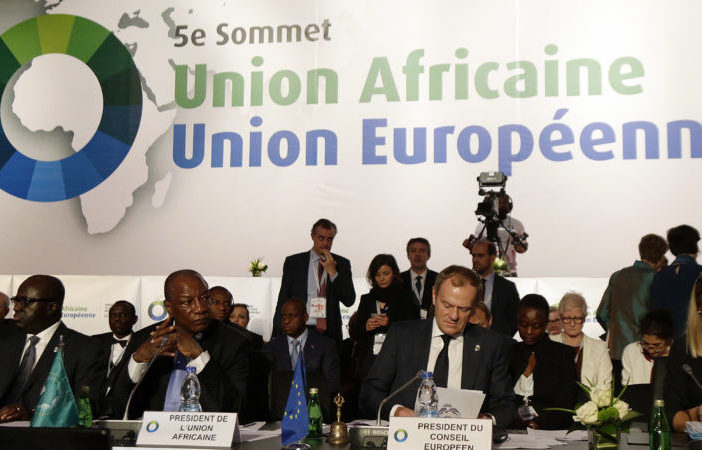By Benjamin Fox | EURACTIV.com
Speculation that Commission President-elect Ursula von der Leyen could appoint a Commissioner specifically for Africa turned out to be much ado about almost nothing, if her team of Commission nominees unveiled last week is anything to go by.
The three Commissioners dealing with EU-Africa relations will be the Foreign Affairs High Representative, Josep Borrell; the Commissioner for ‘Protecting the European Way of Life, Margaritis Schinas, whose portfolio includes migration control; and International Partnerships Commissioner, Jutta Urpilainen.
The only significant change is the replacement of the ‘Development’ Commissioner with a Commissioner for ‘international partnerships’, and it is unclear whether this marks a rhetorical or substantive change.
The emphasis on ‘partnerships’ rather than ‘development’ potentially signals a shift away from traditional donor/recipient relations, and the nomination of Urpilainen, a Finnish parliamentarian who served as her country’s special envoy to Ethiopia, has been widely welcomed.
The Finnish Commissioner-designate “recognises the importance of the future relationship between Africa and Europe and the need for a genuine strategic partnership between the two continents that harnesses the potential of Africa’s growing youth population,” said Emily Wigens, director of ONE’s European election campaign.
CONCORD director, Tanya Cox, also said there was a positive side to the new portfolio – “it is less neo-colonial (sounding)”. But she pointed out that the ‘International Partnerships’ the von der Leyen Commission has in mind will not deal with advanced economies.
In her opening statements, von der Leyen talked of the EU being a ‘neighbour’ and ‘partner’ with the African continent, rhetoric similar to that used by her predecessor.
Jean-Claude Juncker waited until his ‘State of the Union’ speech in September 2018 to show any interest in EU-Africa relations, surprising many with the offer of a ‘partnership of equals’, based around a continent-to-continent trade deal.
That rhetoric has yet to be followed up. The EU executive has provided €50 million to fund technical support for the African Union’s team tasked with drawing up regulatory standards for the African Continent Free Trade Agreement. However, the prospects of an EU-Africa trade and political agreement appear to be distant.
“The Europeans will have to decide for themselves on how they want to engage,” said Carlos Lopes, the African Union Commission’s high representative on Cotonou, a treaty between the EU and Africa, Carribean and Pacific states.
The rhetoric is “all very nice and welcome”, says Lopes, “but these promises are not grounded in a continent-continent instrument.”
The Juncker Commission has been increasingly defensive about China’s emergence as Africa’s main partner when it comes to trade, investment and politics, setting up a European External Investment Programme and Trust Fund for Africa, both oriented around leveraging public money to generate private investment.
This mindset seems set to continue, which means development policy could lose out.
“The emphasis on ‘value for money’ is very worrying,” said Cox. “There is an innate contradiction to this. It’s very hard to reach the most left beyond.”
“I do question whether she (von der Leyen) fully understands sustainable development,” she added.
The von der Leyen Commission’s first Africa-related priority will be to finalise the successor to the Cotonou Agreement, which includes 51 of the 54 African states.
The Agreement expires in 2020 and a June deadline lapsed without agreeing a new accord. Talks moved slowly in the first six months of 2019 and will not begin again in earnest until the new European Commission takes office in November.
In the meantime, the Commission faces its own internal power struggle vis à vis Africa and development policy. The European External Action Service (EEAS), the EU’s diplomatic service, is anxious to establish a more strategic relationship between the EU and the African continent, but DG DEVCO is leading on the post-Cotonou talks.
No ‘fresh start’ on migration
Von der Leyen has expressed her wish for a “fresh start” on EU migration policy, with the question of migrant resettlement remaining unanswered under her predecessor. But assigning migration policy to Greek nominee Margaritis Schinas, as part of a clumsily-named ‘Protecting our European way of life’ portfolio, prompted criticism that the emphasis of the new EU executive will be on keeping migrants out of Europe.
“We blew the migration portfolio out of all proportion and it looks like it will continue,” said Cox. “Von der Leyen said she wants a fresh start on migration, but it doesn’t look like it will change,” she added.
There is, however, hope that with a group of 13 European Parliament committee chairpersons voicing their complaints, the job title will be amended before Schinas takes office.
Meanwhile, Borrell’s record as Spanish foreign minister suggests that he will continue to support migration control and pacts between the EU and North African countries, the first of which is likely to be with Morocco.
In July, the Moroccan Navy underwent training exercises with EUROMARFOR, a European Maritime force comprising vessels from France, Italy, Portugal and Spain. It has also migration and human trafficking, and included discussions about special forces and maritime capabilities, as well as increasing cybersecurity collaboration.
Weeks earlier, Borrell’s soon-to-be-predecessor Federica Mogherini and Moroccan Foreign Minister Nasser Bourita agreed to begin talks on a new trade deal based around a ‘Euro-Moroccan Partnership for Shared Prosperity’.
Brussels is offering the prospect of visa-free access to the EU as a sweetener. The trade talks are expected to start immediately after the new Commission takes office in November and dominate the next 18 months.
The new deal will also offer the prospect of Morocco being integrated into a number of new EU programmes and agencies, ranging from university research to maritime security and energy and climate change.
[Edited by Zoran Radosavljevic]
Languages: Deutsch







